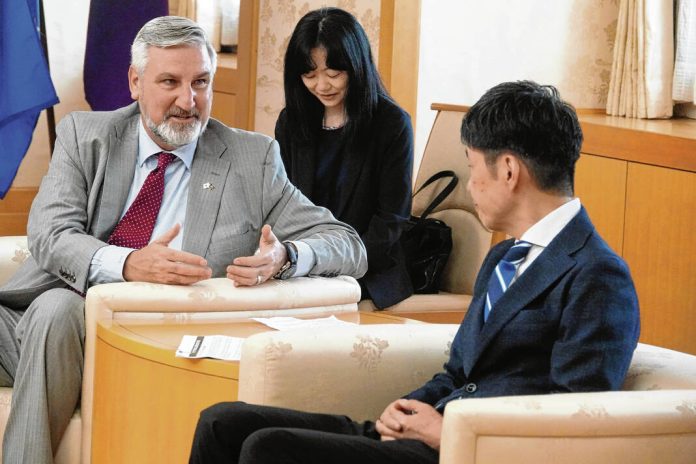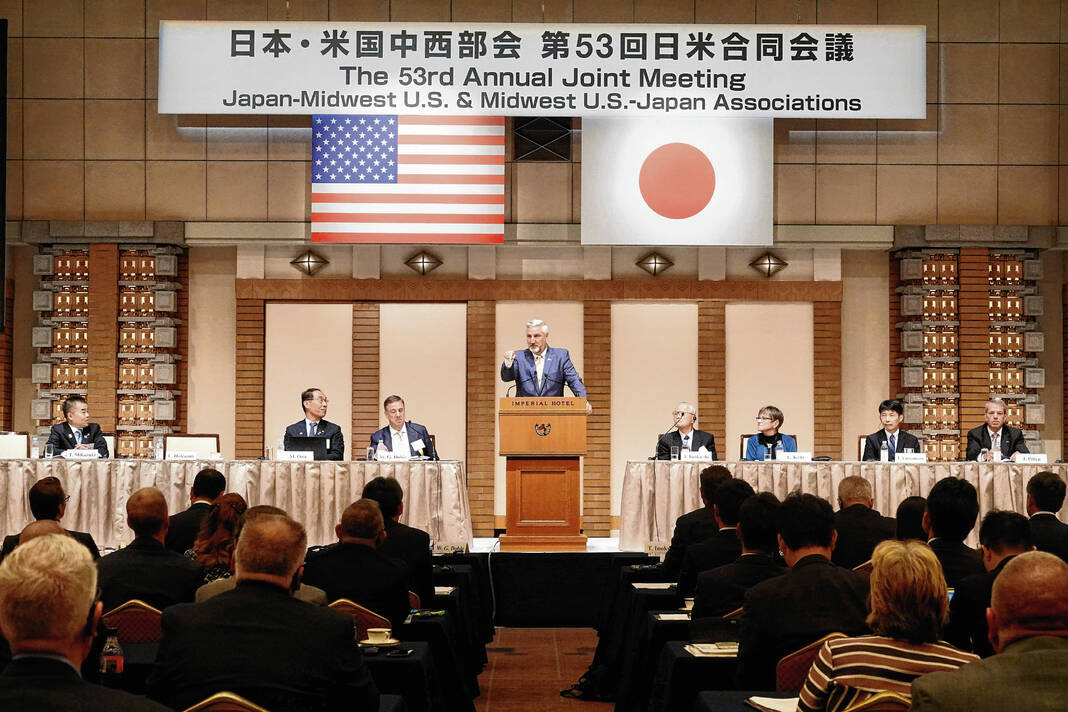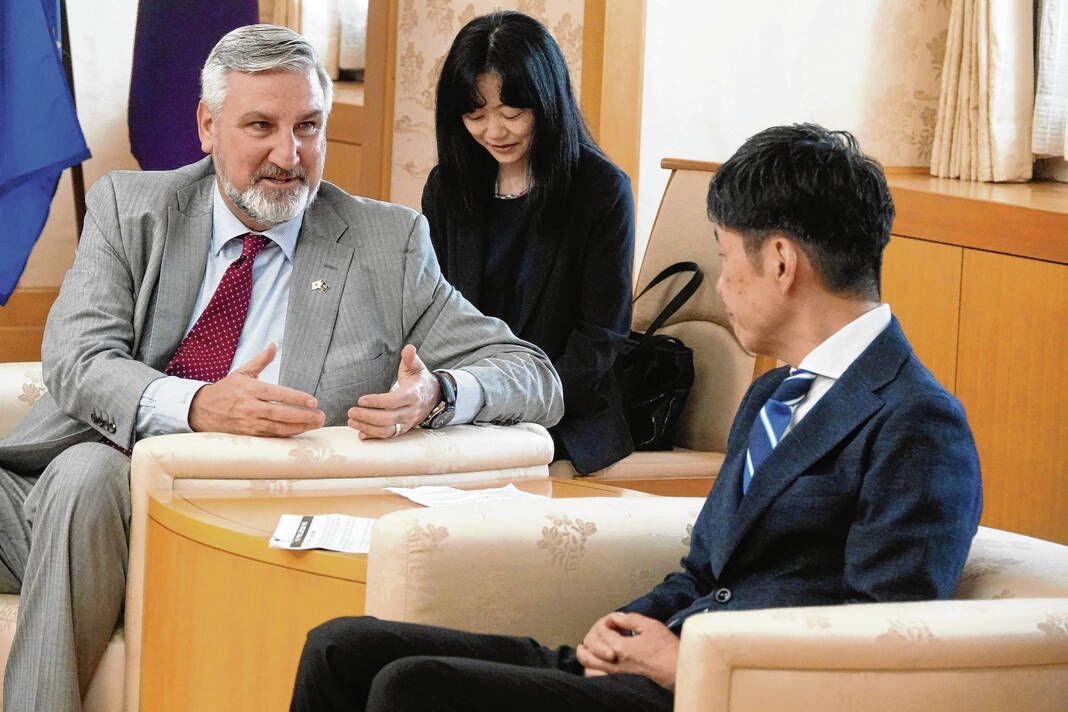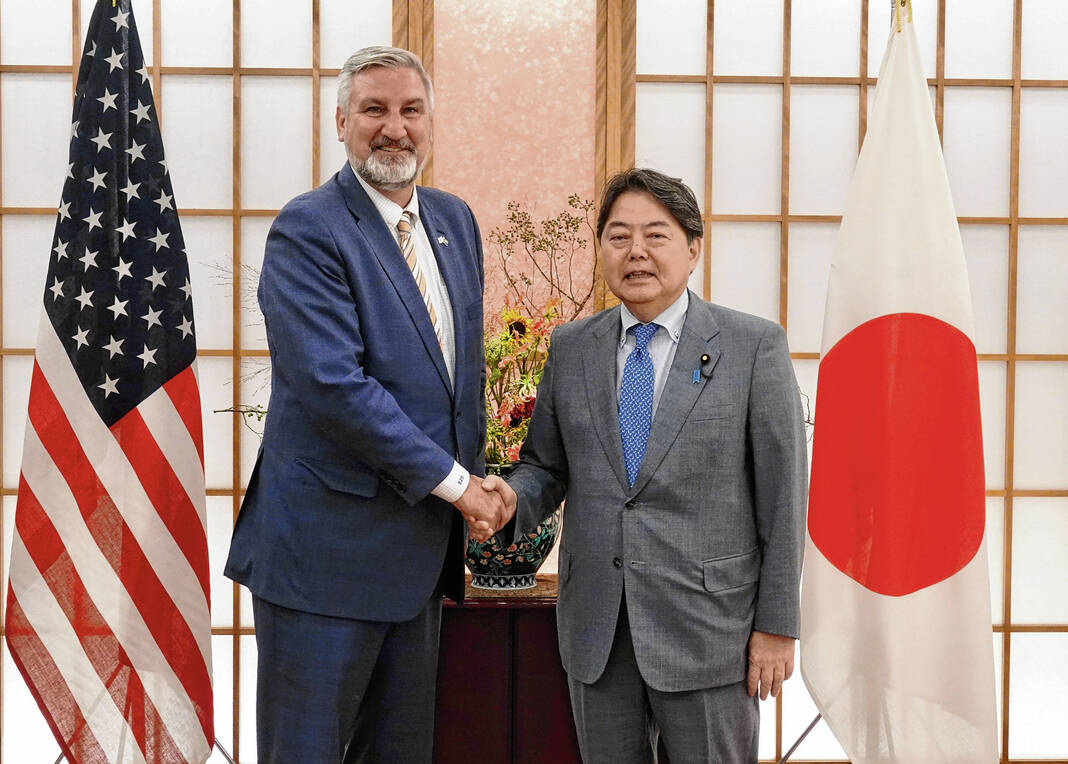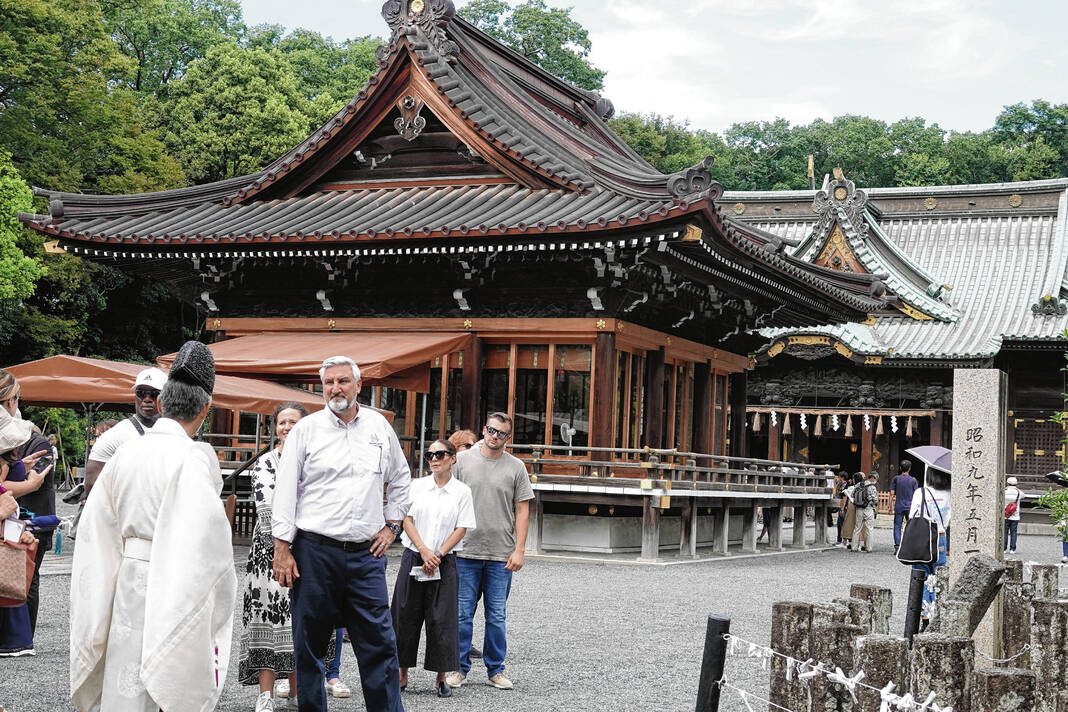Indiana Gov. Eric Holcomb is confident his recent economic development trip will be fruitful, though he is concerned about a potential auto workers strike at home.
Holcomb, a Republican in his second and final term, has been in Japan since Sept. 8 as part of a roughly week-long economic development trip. It’s his third official visit to Japan and likely his last. It is also his 16th international trip as governor.
Japan is Indiana’s largest foreign investor and invests more in the Hoosier state per capita than any other U.S. state. More than 300 of Indiana’s foreign-owned businesses are Japanese-owned, employing more than 55,000 people, according to the Holcomb’s office.
At least 15 or so Japanese companies and/or their subsidiaries have facilities in Johnson County. This includes Nachi America in Greenwood and Aisin Logistics Center, KYB and NSK in Franklin, according to government data.
While in Japan, Holcomb attended and gave remarks at the Midwest U.S.-Japan Association’s annual conference in Tokyo. He’s also met or scheduled to meet with representatives of some of the Japanese companies who have facilities in Indiana: Subaru Corporation, Toyota Motor Corporation, Honda Motor Company and Hitachi Ltd.
Holcomb also met with Japanese officials, including Gunma Prefecture Gov. Ichita Yamamoto. He visited the manufacturing-focused Gunma Prefecture, located northwest of Tokyo, which established a formal partnership with Indiana a year ago.
Economic development
In a video call from Japan with Indiana reporters, Holcomb expressed confidence that the trip and his efforts with the Japanese government and business leaders will be successful. There is some “fierce” competition as four other U.S. governors are also in Japan, promoting their own states and agendas, he said.
Having already met with Subaru, Toyota and Honda, Holcomb says he and others are assuring the companies Indiana will be supportive in the future as they make big decisions and determine their future steps as the world continues to transition in the electrification and digitization of industries.
This doesn’t just apply to the automakers either.
“I don’t just have a narrow vision of just those three world-class automakers,” Holcomb said. ”There’s so many other companies that we have talked to while we’re here that do have in mind plans for expansion, and we are seeking new business as well while we’re here.”
He later said there would not be anything to announce immediately, but he’s “pretty confident there will be some good news to share later.”
Acknowledging how the Japan trip would be one of his last as governor, Holcomb said he did not necessarily feel extra pressure or urgency to bring something more concrete back to Hoosiers. Later, he said success for trade missions can be measured by several factors including who shows up and what is to come from the conversations, Holcomb said.
The world is run by those who show up, and Indiana shows up, he said.
“It’s always noted who’s absent — not just who attends,” Holcomb said. “We were born and raised Hoosiers … and kind of ‘Midwest nice,’ and we like to be polite and be accounted for.”
When looking at what’s to come for the future of mobility for automakers — both the three Japanese and the two American automakers located in the state — Holcomb says they all have plans and the state wants to be part of it.
“When you think about what is to come, what will the industry look like 10 years from now … they all have plans on where they want their business to be, and we want it to be partly due to the Indiana contribution,” Holcomb said. ” I judge it by what is to come, and how those conversations are proceeding so that they can make informed decisions, and ultimately more investments in our home state.”
Auto strike concerns
U.S. automakers are approaching walkouts from union employees amid contract disagreements, and Holcomb was asked about the possible strikes Tuesday.
Last week, United Auto Workers President Shawn Fain warned that the union plans to go on strike against any Detroit automaker that hasn’t reached a new agreement by the time contracts expire at 11:59 p.m. Thursday night. On Wednesday, sources told the Associated Press that targeted strikes were being considered at a small number of factories run by General Motors, Stellantis and Ford if they can’t reach contract agreements.
Holcomb told reporters Tuesday he had “concerns” because of the industry’s prominence throughout the state, particularly in Fort Wayne and Kokomo.
However, Holcomb said he was not going to be “one of those individuals who lobbed something from the cheap seats, some explosive rhetoric or statements, to try to encourage agreement.”
“I’m just assuming there are a lot of — probably too many — cooks in the kitchen right now — and the kitchen’s getting pretty hot,” he said.
Holcomb believes and hopes that both sides can strike a balance in their approach to these discussions —something he also brought up while speaking with Democratic Michigan Gov. Gretchen Whitmer on Monday. He hopes the conversations are constructive, he said.
“This is not an opportune time for the wheels to come off, so to speak,” Holcomb said. “And I just hope that they can get to a place to where they can continue to be the world-class companies they are and meet the market demands because the demands are great. We want to do anything that we can to be helpful, and everyone knows that I’m here for that.”
Boone County project
Holcomb also addressed economic development at home, specifically the LEAP Innovation and Research District in Boone County. The project has generated outrage from both residents and stakeholders over proposals to pump millions of water to the site daily from Tippecanoe County. There have also been complaints about transparency.
Though they are not able to “turn all the cards face up yet,” the state is going to do its homework before any action is taken in terms of bringing businesses in, he said. Officials are doing their homework and getting in shape, he said.
State officials are going to continue to think “big and be bold,” and Project LEAP is an example of that, he said. The state has identified over 300 “shovel-ready” sites around the state that are attractive to employers with very high-wage jobs, Holcomb said.
”We’re going to, every day of the week, be in shape to get those jobs,” he said. “LEAP is something that positions us, if it all works out, if the data leads us to the decision, that we can do it.”
Officials are not going to “rob Peter to pay Paul,” Holcomb said, referring to the water plans.
“The facts will set us free, so to speak,” he said. “We’re going to stay on this path to be an attractive state, and we’re going to grow at the ability that our natural resources and our God-given talent puts us in a position to realize.”


